
NI council elections 2023: A Sinn Féin coronation after a 'tsunami' election
Crowned local government kingpins without even breaking a sweat.
From the moment the first ballot box was opened the party was on course to make history.
But not even Sinn Féin predicted the scale of its success.
Sweeping to victory with a staggering 144 seats, leaving the once dominant DUP trailing 22 seats behind.
Almost one in every three votes cast went to Sinn Féin and it picked up new seats in 10 of the 11 super councils.
Even in the council where it suffered its greatest loss last time - Derry and Strabane - the party secured seats for all of its 18 candidates.
Along the way Sinn Féin also picked up some trophy seats in the unionist heartlands of Ballymena, Lurgan and Coleraine.
A 'green wave'
It was, to quote Naomi Long, a "tsunami" which caught the other parties by surprise.
Such was the size of the green wave, it left some unionists bewildered.
One former Ulster Unionist minister suggested Sinn Féin might scale back its ambition in the interest of preserving cross-community relations.
He raised it during a count centre chat with Sinn Féin President Mary Lou McDonald.
'Wake up and smell the coffee'
A more radical plan was floated by one-time UUP leader Mike Nesbitt who wants to realign unionism into two parties, one traditional, one more liberal.
He was even prepared to sacrifice his own party to make it happen.
While another former minister, the DUP's Edwin Poots, said the result should act as "a wake up and smell the coffee moment" for unionists.
But others have credited his party for laying the foundations for Sinn Féin's success.
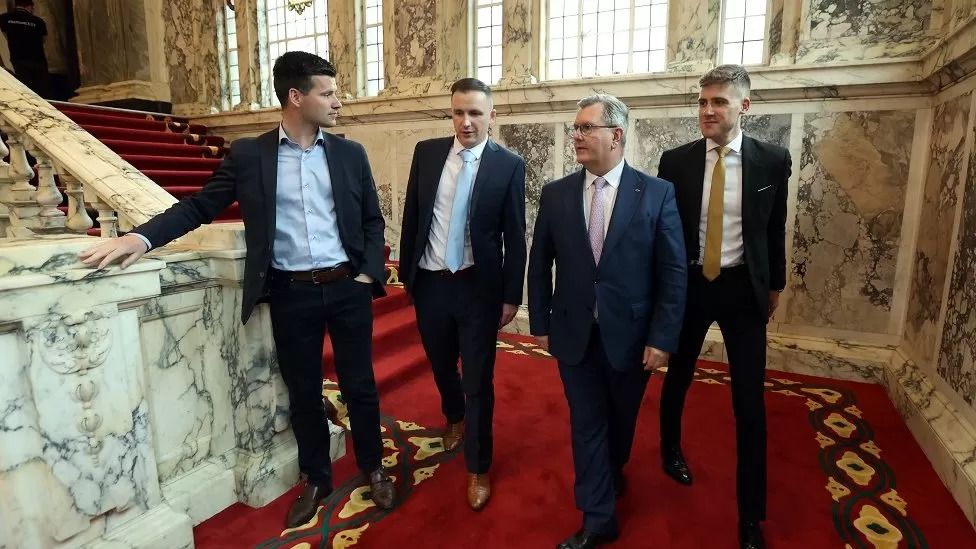 Jonathan Buckley MLA, Councillor Andrew McCormick, DUP leader Sir
Jeffrey Donaldson and Councillor Dean McCullough at Belfast City Hall
Jonathan Buckley MLA, Councillor Andrew McCormick, DUP leader Sir
Jeffrey Donaldson and Councillor Dean McCullough at Belfast City Hall
The DUPs Stormont boycott, which is effectively blocking Michelle O'Neill from becoming first minister, helped mobilise the nationalist vote.
That, according to the SDLP, played into the hands of Sinn Féin.
Hence the party framed its campaign around a would-be first minister willing to work for all if only she was allowed.
Michelle O'Neill's attendance at the King's Coronation helped to reinforce that "positive" message.
But while the nationalist electorate was energised to vote, many unionists stayed at home.
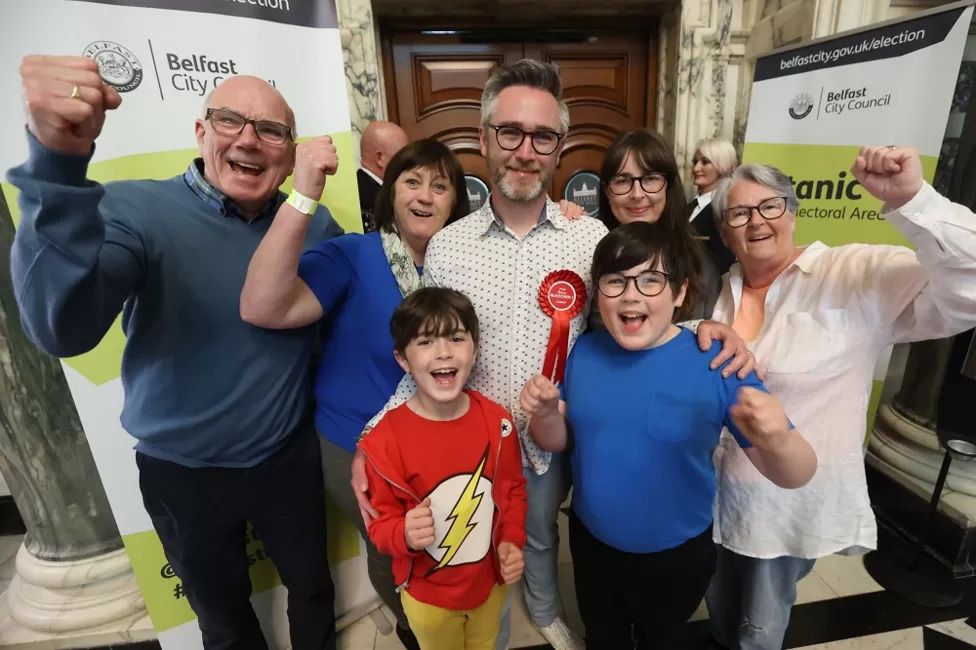 The SDLP's Gary McKeown had support in the form of his sons Thomas and James
The SDLP's Gary McKeown had support in the form of his sons Thomas and James
Gary McKeown (centre) from the SDLP at Belfast City Hall during in the Northern Ireland council elections.
That was reflected in the turnout figures.
Despite that, the DUP still managed to cement its vote.
Running fewer candidates allowed the party to better manage its support base
It suffered some losses but made significant gains at the expense of the UUP.
That leaves Sir Jeffrey Donaldson with a renewed mandate to seek the changes he needs to the Windsor Framework before returning to Stormont.
But there is nothing to suggest that process could lead to a quick return of the power-sharing institutions
Much will depend on whatever legislation the government brings forward to ease unionist concerns.
Alliance Party leapfrog
On another day the Alliance Party would have grabbed the headlines.
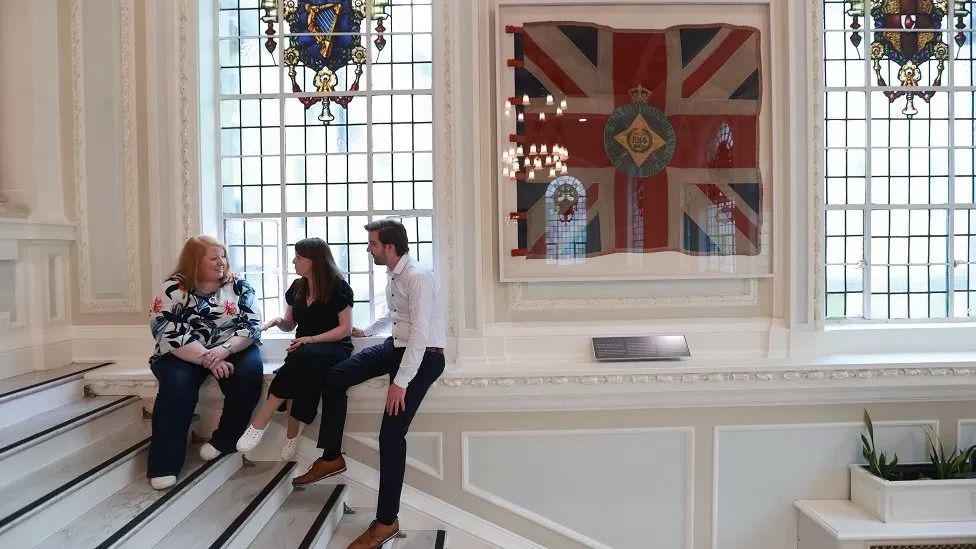 Alliance Party leader Naomi Long with Nuala McAllister and Sam Nelson wait it out at Belfast City Hall on Friday
Alliance Party leader Naomi Long with Nuala McAllister and Sam Nelson wait it out at Belfast City Hall on Friday
Alliance Party leader Naomi Long (left) with Nuala McAllister and Sam Nelson at Belfast City Hall as the results come in for the Northern Ireland local elections. Picture date: Friday May 19, 2023. PA
Leapfrogging the Ulster Unionists to become the third-largest local-government party is another momentum builder.
Picking up an extra 14 seats has made the party a formidable force on mostly unionist controlled councils.
But the loss of its only two councillors in Derry and Strabane is a significant blow for a party keen to build beyond its power base in the east.
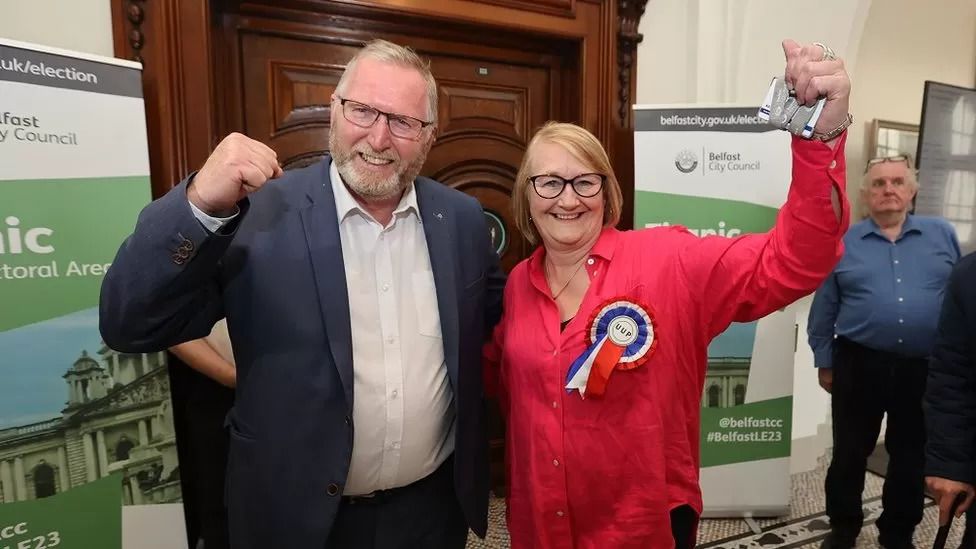 Ulster Unionist Party candidate Sonia Copeland celebrates winning a seat with party leader Doug Beattie
Ulster Unionist Party candidate Sonia Copeland celebrates winning a seat with party leader Doug Beattie
As expected, the Ulster Unionists and SDLP suffered some heavy losses.
Losing 21 seats has severely weakened the UUP's power base in many councils where the party once dominated.
While the SDLP will point to gains and seats retained in Belfast in the face of the Sinn Féin surge, the party has lost ground in Derry and Strabane where it is eight seats behind Sinn Féin.
Questions will once again be asked about Doug Beattie's and Colum Eastwood's leadership but even before the final tallies both dismissed any talk of change.
The TUV has recovered the seven seats it lost in 2019 and managed to add two more but it didn't scale the heights of its assembly success last year.
While the Green Party held on to three seats but could soon be on the hunt for a new leader after Mal O'Hara lost his seat in Belfast council.
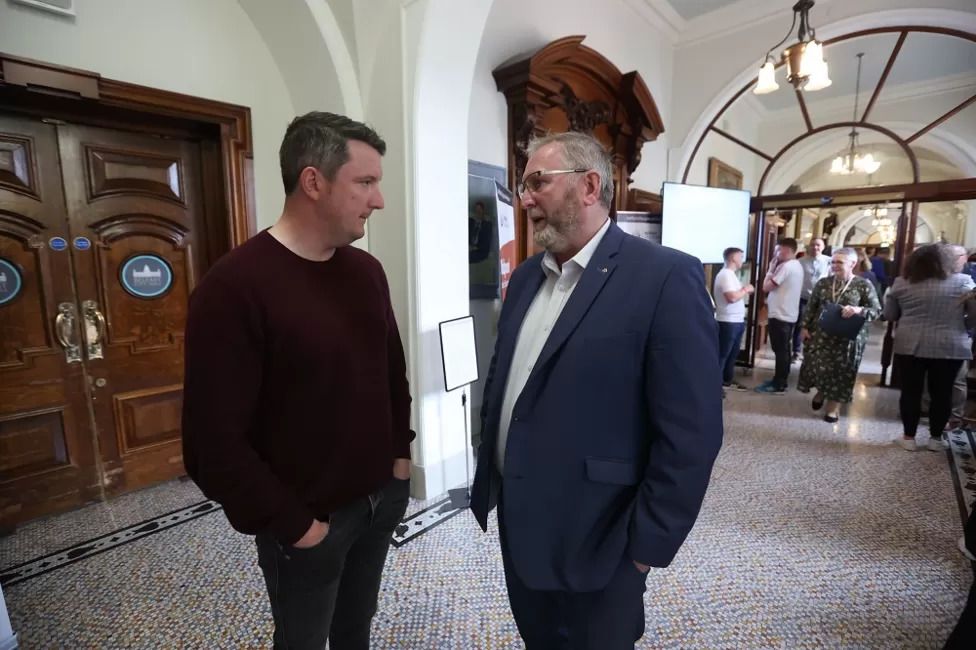 Sinn Féin's John Finucane and UUP leader Doug Beattie stop for a chat
Sinn Féin's John Finucane and UUP leader Doug Beattie stop for a chat
Like the Greens, People Before Profit also felt the squeeze of the Sinn Féin surge and has been reduced to two council seats.
While the pro life Republican Party Aontú has been wiped from the political landscape after losing its only two councillors.










